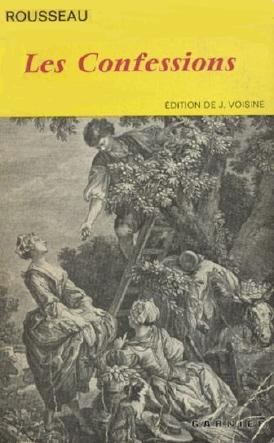
Edward Winter
‘Considering the general sad state of chess knowledge 200 years ago, and the fact that he made his mark in other fields, Jean-Jacques Rousseau played a respectable game.’
So wrote Irving Chernev when giving, on pages 330-331 of 1000 Best Short Games of Chess (New York, 1955), the score of the game Rousseau v Conti, Montmorency, 1760: 1 e4 e5 2 Nf3 Nc6 3 Bc4 Bc5 4 c3 Qe7 5 O-O d6 6 d4 Bb6 7 Bg5 f6 8 Bh4 g5 9 Nxg5 fxg5 10 Qh5+ Kf8 11 Bxg5 Qg7 12 f4 exd4 13 f5 dxc3+ 14 Kh1 cxb2 15 Bxg8 bxa1(Q) 16 f6 Qxg8 17 Bh6+ Qg7 18 Bxg7+ Kg8 19 Qe8 mate.
As will be shown below, it was known well before Chernev’s time that the game was not played by Rousseau, but when anything to do with chess is attached to a famous name the two often become indissociable.
Knowledge of the chess activity of Jean-Jacques Rousseau (1712-1778) is chiefly derived from his autobiography Les Confessions, published a few years after his death. In the fifth book he described his introduction to the game at the hands of Gabriel Bagueret of Geneva, and in book seven he recorded meeting chessplayers in Paris (‘je fis là connaissance avec M. de Légal, avec un M. Husson, avec Philidor, avec tous les grands joueurs d’échecs de ce temps-là’) and chronicled the lack of improvement in his own play. Book ten described his chess encounters with Prince Conti.
These passages are too familiar to be quoted here, and English translations may be found in many chess books, such as:
- Chess Pieces by N. Knight (London, 1949), pages 131-134.
- The Chess Reader by J. Salzmann (New York, 1949), pages 103-105.
- The Treasury of Chess Lore by F. Reinfeld (New York, 1951), page 271.
- Caissa’s Web by G. Harwood (London, 1975), page 104.
- A History of Chess by H. Golombek (London, 1976), pages 116-117.
Moreover, the complete text of Rousseau’s Les Confessions is readily found online.

The above game allegedly played between Rousseau and Prince Conti (1717-1776) was given wide currency by James Mason on pages 124-125 of Social Chess (London, 1900). He dated it 1759 and stated that the finish was ‘16 f6 and wins’. When the book was reviewed on pages 53-56 of the February 1900 BCM, a full page was devoted to discussing the Rousseau v Conti game:
‘We are not aware of the source from which this has been drawn; the only original treatise on chess published in France during last century was the Traité des Amateurs, 1775, and this was mainly devoted to odds games. Where then was this game preserved? In an age when even the ten match games between Philidor and Stamma were allowed to drop into oblivion, and in a country whose players were even more backward in recording games than were the English contemporaries of Philidor, who would have recorded this one, and with what object? The passage relating to chess in Les Confessions has an interest of its own, but lends no support to the ascription of this game.’
After summarizing chess-related passages from Les Confessions (including Rousseau’s reference to having bought a chess set and a copy of the Calabrese, i.e. Greco), the BCM review continued:
‘From all this it would appear that Rousseau never attained any particular proficiency at chess, nor regarded himself as a good player; but its chief value for the purpose in hand lies in the reference to Greco.’
The BCM then pointed out that the first 11 moves of the Rousseau v Conti game ‘will be found in Greco (Lewis’s translation, 1819, page 21)’ and observed regarding a remark by Mason (‘White plays very brilliantly’):
‘Quite so; that is a good reason why the authenticity of the game should be suspected; it is the play of a pupil who has not merely learnt his opening by heart but who has so thoroughly entered into the spirit of his brilliant master that when thrown on his own resources by a deviation from his “book” he can continue and wind up the game in a manner hardly surpassed by anything to be found in that book. Who, in the light of his own narrative, would venture to say that Jean-Jacques was such a pupil? We suspect that the concluding portion of the game is the work of an Italian author subsequent to Greco, and was intended to complete his analysis on a point where it was regarded as deficient; as to how the game came to be associated with the name of Rousseau we prefer to reserve our conjectures, ignoring the source from which Mr Mason obtained it.’
A few years later I. Grünberg wrote, with research assistance from Alexis François, an academic article ‘Rousseau joueur d’échecs’ on pages 157-174 of Annales de la société Jean-Jacques Rousseau, volume three (Geneva, 1907).
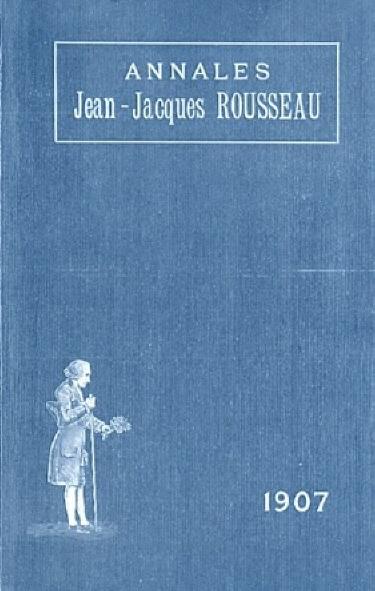
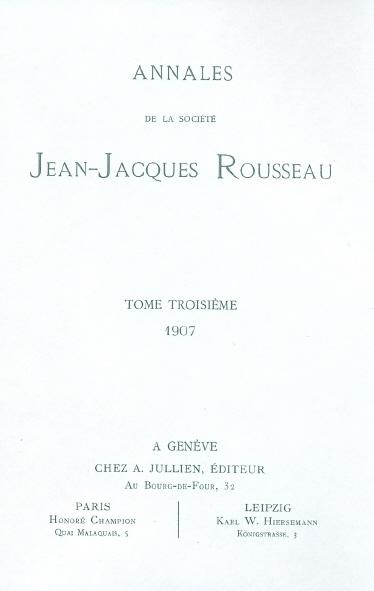
Grünberg began not with Les Confessions but with an extract from a letter written by Rousseau to M. de Saint-Germain (Monquin, 26 February 1770):
‘Le jeu: je ne puis le souffrir. Je n’ai vraiment joué qu’une fois en ma vie, au Redoute à Venise; je gagnai beaucoup, m’ennuyai, et ne jouai plus. Les échecs, où l’on ne joue rien, sont le seul jeu qui m’amuse. Je n’ai pas peur d’être un Béverley.’
Turning to Les Confessions, Grünberg quoted not only the usual passages but also a reference, in book ten, to Rousseau’s desire in Montmorency to play chess against two acquaintances, Ferraud (or Ferrand) and Minard:
‘Je ne sais pas pourquoi ils se souciaient de moi; pour moi, je ne me souciais d’eux que parce qu’ils jouaient aux échecs; et, pour obtenir une pauvre petite partie, j’endurais quatre heures d’ennui.’
Next, Grünberg discussed Rousseau’s well-known remark to Prince Conti, also in book ten of Les Confessions, about having too much respect for the Prince not to beat him at chess. (‘En finissant, je lui dis d’un ton respectueux, mais grave: Monseigneur, j’honore trop Votre Altesse Sérénissime, pour ne la pas gagner toujours aux échecs.’) Noting that a nineteenth-century writer on Rousseau, Saint-Marc Girardin, had opined that Rousseau did not speak those words, Grünberg disagreed, pointing out that Rousseau had related the same version to Pierre-Alexandre Du Peyrou in a letter dated 27 September 1767.
Grünberg then suggested that Rousseau understated his chess skill, given that he won games against Prince Conti, who ‘passait pour un joueur habile, élève du chevalier de Lorenzi’. The article gave the moves of the Rousseau v Conti game, unquestioningly specifying the source as follows in a footnote:
‘Ce document a été reproduit par la revue Le Palamède, année 1843, p. 41-42, au milieu d’une fantaisie de Marie Aycard, intitulée “Jean-Jacques et le Prince de Conti”. L’original avait été communiqué à la revue par un de ses abonnés, M. Doazan, “possesseur de fort curieux manuscrits sur les échecs au siècle dernier”.’
After quoting from Richard Twiss’ book Chess (London, 1787) that ‘Rousseau was very inexpert at chess, though an enthusiastic admirer of it’, Grünberg stated that an opponent of Rousseau’s, the Abbé Jean-Joseph-Thérèse Roman, had handed down to posterity a detailed written account of one of their games, in a lengthy poem probably composed in 1762. Grünberg noted that the fourth chant (i.e. canto) related Roman’s victory over Rousseau and that the account, the poem and the game-score had been published in Le Palamède, 1836 (pages 265-279). Below are the moves as they appeared in that earlier source:
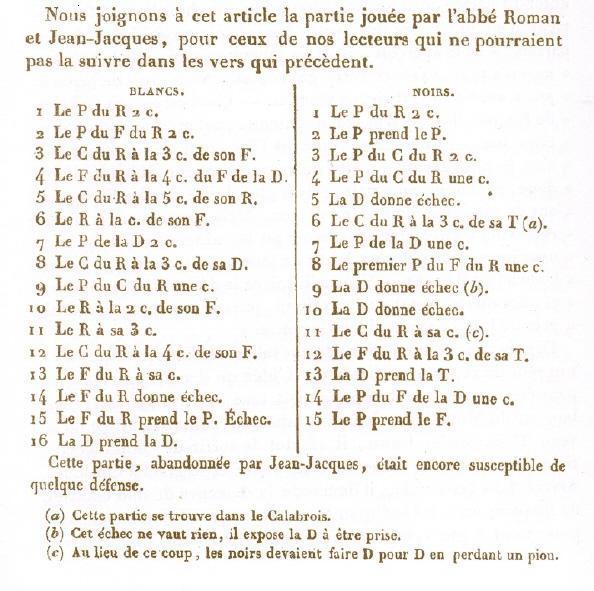
The moves were thus as follows: 1 e4 e5 2 f4 exf4 3 Nf3 g5 4 Bc4 g4 5 Ne5 Qh4+ 6 Kf1 Nh6 7 d4 d6 8 Nd3 f3 9 g3 Qh3+ 10 Kf2 Qg2+ 11 Ke3 Ng8 12 Nf4 Bh6 13 Bf1 Qxh1 14 Bb5+ c6 15 Bxc6+ bxc6 16 Qxh1 Resigns.
Grünberg drew a number of conclusions about Rousseau from the above game, which, in common with the Conti score, he assumed to be genuine.
His article attracted attention, and not least after most of it was reproduced in La Stratégie, June 1908, pages 165-177. Shortly afterwards, H.J.M. Murray contributed an article entitled ‘Rousseau and Chess’ to the August 1908 BCM, pages 329-331, praising Grünberg’s industry and building on the information provided, to demonstrate that neither game attributed to Rousseau was genuine. As regards the philosopher’s meeting with Prince Conti, Murray wrote:
‘A fictitious account of this meeting was written by Marie Aycard for the Palamède in 1843, and in the course of the story the game to which I have referred is given. It is pretended that the Chevalier de Lorenzy had taken it down at the time, and that M. Doazan had supplied it from the MS. All this is very circumstantial, but the only piece of truth in it is the fact that M. Doazan had supplied the game from a MS in his possession. But this MS was not the work of de Lorenzy, neither did it contain eighteenth-century games. The only MS in Doazan’s possession was the so-called “Doazan MS”, which was described in the Palamède in 1843; and at a later time, after William Lewis had publicly expressed doubts as to the genuineness of the MS, it was seen by v.d. Lasa in 1855. V.d. Lasa extracted the games, and circulated them among his friends in a lithographed edition, under the title of Recueil de Parties d’Echecs, Bruxelles, 1855. The MS has disappeared since the sale of M. Doazan’s library in 1865, but, thanks to v.d. Lasa, we know exactly what the MS was, and what it contained. It was an Italian compilation of the early seventeenth century, the work of some admirer or companion of that Polerio who accompanied Leonardo – il Puttino – on his journey to Madrid to play Ruy López, about 1575. That the supposed game Rousseau v the Prince de Conti was obtained from this MS is quite clear, for it occurs there from the first move to the last. There, however it is given as from the play of the Spaniard Busnardo, a contemporary of Ruy López. The Doazan MS stands in close connection with an Italian MS at Paris (It. 955), and the same game occurs in this MS, with the title, “Altra manera d’uscire del busnardo”. It is clear that the modern ascription of the game is as fictitious as the story in which Aycard set it, and that later writers have made the easy mistake of treating chess fiction as chess history.’
Murray then described the circumstances of the Roman v Rousseau game and concluded:
‘... The game proves to be a Greco game (Hoffmann’s Games of Greco, ch. xlvi, page 125), and we must accordingly reject this game also as a literary forgery. We possess no genuine example of Rousseau’s play, and perhaps it is as well for his reputation that it is so. A player who either would not or could not make a scientific study of the game, who derived no benefit from practice with Philidor, who reached the limit of his powers in a single day, assuredly could know nothing of the brilliancy of chess.’
The article by Murray was mentioned on page 95 of the Chess Weekly, 22 August 1908, which offered some general thoughts on Rousseau’s chess prowess:
‘There is a sort of credit which comes to a brilliant man from doing badly what other and less gifted mortals do extremely well; and when Rousseau gives account in the Confessions of his not merely indifferent but conspicuously abject skill at chess, declaring that he never improved beyond the point he reached on his first day’s acquaintance with the game, we think he was fully aware of the paradox involved, and wittingly sacrificed the essential truth of his words to their literary effect. It would, indeed, be picturesque incapacity which did not measurably profit by exercise and experience; and if, contrary to his wont, Rousseau deceived himself upon this point, it must have been that he knew so little of the game as not to have a competent opinion whether he progressed or not. It is, of course, hard to detect improvement in your own game from day to day; but when the period of observation is long enough, it is as apparent as the moon’s increase.
It is, however, the way of confession to exaggerate, and Rousseau was far too shrewd not to see that, by proclaiming himself a negative monstrosity at chess, he could very well serve not only his taste for confession but also his renown as no ordinary manner of man. It is, to be sure, a trifling incident in his book, but a grain of insincerity, if such it were shown to be, would pollute all his mighty rivers of confession.
We are reminded of that good old saint who could never – or hardly ever – talk of sinners but he must add, “Of which I am the chiefest”; yet we very well know he was no such thing.’
Murray mentioned Rousseau in a 15-line footnote on pages 861-862 of A History of Chess (Oxford, 1913), where he used the word ‘forgery’ to describe both game-scores discussed above. On page 54 of A Short History of Chess (Oxford, 1963) the man whom his BCM article had described as ‘the Spaniard Busnardo’ was referred to as ‘a Roman player named il Busnardo’. It may be mentioned here that the Rousseau v Conti game had been published on pages 228-229 of the Chess World, 1865. As noted by Murray in his BCM article, the game also appeared on page 1 of Chess Sparks by J.H. Ellis (London, 1895).
A general feature ‘Jean-Jacques Rousseau et les échecs’ by Anatole Mouterde is to be found on pages 253-254 of La Stratégie, December 1919, and six years later an article ‘Jean-Jacques Rousseau joueur d’échecs’ was published in issue four of Les Cahiers de l’Echiquier Français, pages 97-105. It drew heavily on Grünberg’s work, but had no mention of Murray’s. Subsequent features on Rousseau which we have seen show little or no sign of scholarship, one example being on page 59 of the November 1934 issue of El Ajedrez Español (an anecdote about Rousseau and ‘el caballero de La Mothe-D’Urbin’).
Endnote: the above quotations from Les Confessions follow the 1972 Garnier edition edited by Jacques Voisine. It used modern spelling (e.g. ‘j’étais’), whereas Grünberg’s article had the spelling of Rousseau’s day (‘j’étois’).
(4401)
Richard Forster (Winterthur, Switzerland) notes that volume 42 of the Annales de la Société Jean-Jacques Rousseau (Geneva, 1999) has, on pages 95-145, an academic article by Jacques Berchtold entitled ‘Rousseau, joueur d’échecs au café 1770-1771’.
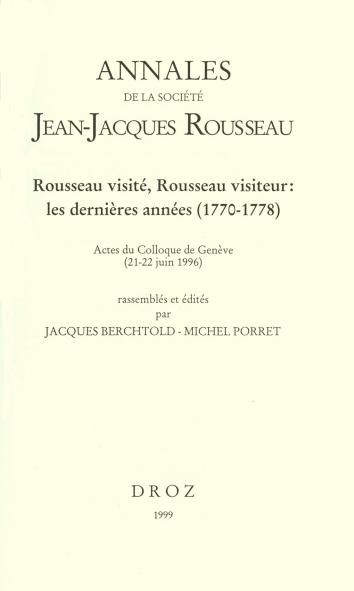
After a discussion of Rousseau’s earlier chess activity, the article focuses on his visits to the Café de la Régence, which began shortly after he returned to Paris on 24 June 1770. Eye-witness reports are quoted, but there is no account by Rousseau himself, as he was conspicuously silent on the subject.
(4419)
On pages 27-30 of his book 13 Kinder Caïssens (Vienna, 1924) Josef Krejcik presented a fictional article entitled ‘Rousseau als Schachspieler’.
(4491)
Courtesy of the Transvaal Leader, page 37 of the February 1913 American Chess Bulletin had a brief feature entitled ‘Rousseau’s Experience and Resignation’.
See too the article ‘Jean Jacques Rousseau’ on pages 44-46 of volume one of Aus Vergangenen Zeiten by Ludwig Bachmann (Berlin, 1920).
Detailed annotations to ‘J-J. Rousseau-Prince Conti, 1759’ were on pages 41-42 of Questions of Modern Chess Theory by Isaac Lipnitsky (Glasgow, 2008).
Trustworthy writers naturally resist the temptation to repeat unverified material, and especially in a domain such as chess lore which is notoriously infested with imprecision and uncertainty.
From page 220 of Total Chess by David Spanier (London, 1984):
‘I can’t resist repeating that old anecdote about the man going into the café [the Café de la Régence] to watch Voltaire and Rousseau play at chess. Mere scribblers, those two, sniffs an acquaintance. “True, but today they play with Philidor!”’
Information is sought about the tale, which had appeared on page 92 of The World of Chess by A. Saidy and N. Lessing (New York, 1974):
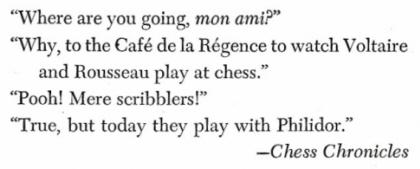
(8866)
The following comes from an article entitled ‘Le Chevalier de Barneville’ by Joseph Méry on pages 117-120 of La Régence, April 1851:
‘En 1768, au coup de midi, vingt ans avant la révolution, le jeune chevalier de Barneville entrait au café Procope et jouait avec Philidor et Jean-Jacques Rousseau. Les beaux esprits du temps formaient galerie, et les graves encyclopédistes, le menton appuyé sur les pommes d’or de leurs cannes, suivaient la marche des parties, et critiquaient le jeu de Philidor, parce que les encyclopédistes critiquaient tout. Un jour, en présence de M. Saint-Amand, qui a été gouverneur des Tuileries en 1848, du général Guingret, alors commandant de l’Ecole militaire, et de M. Devinck, aujourd’hui président du tribunal de commerce de Paris, Labourdonnais engagea un entretien fort curieux avec le chevalier de Barneville.
“Parlons un peu de l’histoire ancienne, mon cher chevalier; comment jouiez-vous avec Philidor?
– Il me donnait le cavalier et le pion.
– J’aurais donc donné, moi, le pion et deux traits à Philidor?
– Sans doute.
– Et quelle partie faisiez-vous avec Jean-Jacques Rousseau?
– Je lui donnais une tour.
– Il était donc bien faible.
– Mais, en revanche, dit le chevalier, il avait un amour-propre colossal, et le plus affreux caractère de joueur d’échecs qui ait existé. Comme il avait la manie de se croire grand mathématicien et de faire de la musique avec des chiffres, il voulait appliquer les calculs algébriques à l’échiquier. Nous le plaisantions fort là-dessus, et alors il brouillait toutes les pièces du jeu avec une certaine rage peu philosophique, et on ne le voyait plus au café pendant quinze jours.”’
(9965)
A cartoon of Rousseau playing chess is in Η ζωή μας είναι σκάκι by Κώστα Νιάρχου/Costas Niarchos (Athens, 1972).
Tarrasch’s well-known reference to being unable to play chess without his king’s bishop, with a reference to Rousseau’s fondness for cats, was in a note to 11 Nd4 in game 19 of his match against Chigorin, 10 November 1893, on page 487 of Dreihundert Schachpartien (Leipzig, 1895):
‘Wie Rousseau beim Dichten seine Katze neben sich haben mußte, so kann ich nicht Schach spielen ohne Königsläufer.’
In issue 17 of the Quarterly for Chess History edited by Vlastimil Fiala, published in 2016, pages 524-525 unwisely give, from an 1867 newspaper, a supposed Rousseau v Conti game. Even the title is mangled:

(10200)
To the Chess Notes main page.
To the Archives for other feature articles.
Copyright: Edward Winter. All rights reserved.